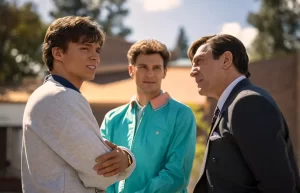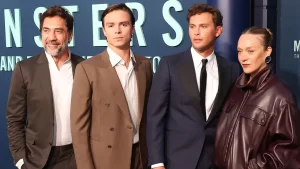The Controversy Surrounding Netflix’s New Menendez Brothers Drama
3 min read
Cooper Koch (left) and Nicholas Chavez play Erik and Lyle Menendez.

Cooper Koch (left) and Nicholas Chavez play Erik and Lyle Menendez.
Netflix’s latest true crime series, Monsters: The Lyle and Erik Menendez Story, has quickly risen to the top of the streaming charts, but it has also sparked significant controversy. This drama, which depicts the infamous case of two brothers who murdered their parents, has drawn criticism from Erik Menendez himself, who claims the show misrepresents the events and his family’s struggles.
The series features Cooper Koch and Nicholas Alexander Chavez as Lyle and Erik Menendez, alongside Javier Bardem and Chloe Sevigny portraying their parents, Jose and Kitty Menendez. This new production is a follow-up to another contentious Netflix series about serial killer Jeffrey Dahmer, both created by Ryan Murphy and Ian Brennan, known for their provocative storytelling.
On August 20, 1989, Lyle and Erik Menendez shot their parents in their Beverly Hills mansion. Initially, they claimed to have discovered their parents’ bodies upon returning home. However, their story unraveled as they faced trials for the murders. After two mistrials, they were eventually convicted in 1996, citing years of abuse as the motive for their actions. The brothers alleged they acted in self-defense due to physical and sexual abuse from their father. The prosecution countered, suggesting their motive was financial gain.
During their joint trial, the judge excluded evidence of abuse, leading to their conviction for first-degree murder and conspiracy. They were sentenced to life in prison without parole, a sentence they continue to serve today.

Monsters aims to explore the complex motivations behind the brothers’ actions, delving into the alleged abuse they suffered. The show attempts to present a balanced narrative by also incorporating the perspectives of their parents, a choice the creators defended as a necessary part of the story. Released on September 19, 2024, the series attracted immediate viewership but received mixed reviews from critics. Some described it as “exhausting” and “messy,” expressing concern over its sensationalized portrayal of sensitive subjects.
Critics from various publications lamented the series for failing to strike the right tone, with The Guardian calling it repetitive and Variety noting it lacked a clear direction. The Telegraph echoed similar sentiments, criticizing the show for turning a tragic story into entertainment fodder, suggesting it exemplifies a troubling trend in the true crime genre.

Erik Menendez publicly responded to the series shortly after its release, describing it as “disheartening slander.” In a statement shared by his wife on social media, he expressed disappointment over the portrayal of both him and his brother, suggesting the depiction is rooted in inaccuracies. He articulated a belief that the show’s narrative is intentionally misleading, further stating, “It is sad for me to know that Netflix’s dishonest portrayal of the tragedies surrounding our crime have taken the painful truths several steps backward.”
Erik emphasized the importance of addressing the realities of male sexual abuse, arguing that the show perpetuates harmful stereotypes about how such trauma is perceived and discussed.

In defense of the series, Ryan Murphy acknowledged the challenges of depicting real-life events, especially those involving sensitive issues. He pointed out that Erik Menendez had made his remarks without having seen the show. Murphy emphasized that a significant portion of the narrative—about 60-65%—focuses on the alleged abuse the brothers faced. He defended the inclusion of the parents’ perspective as a crucial element of storytelling, asserting that it’s essential to consider all viewpoints in such a complex case.
Murphy’s remarks highlight the delicate balance creators must strike when representing real-life tragedies, particularly in a medium often criticized for sensationalism.
Monsters: The Lyle and Erik Menendez Story illustrates the ongoing debate around true crime narratives. As it seeks to explore the multifaceted nature of the Menendez case, the series has prompted reflections on ethics in storytelling, the impact of media portrayals, and the line between entertainment and respect for those involved in tragic events. While it captivates viewers, it also challenges us to consider the implications of how we tell such stories.